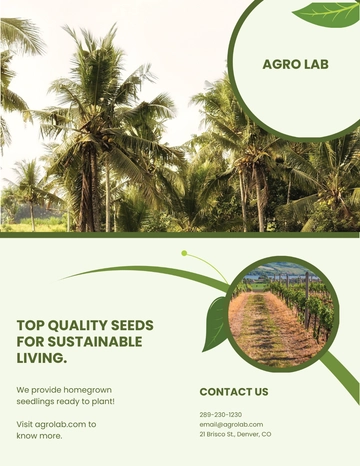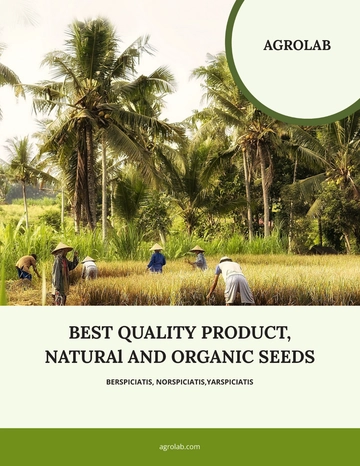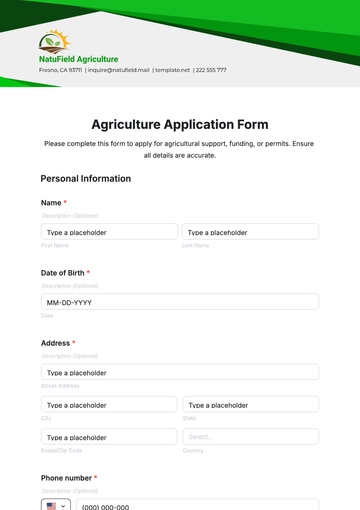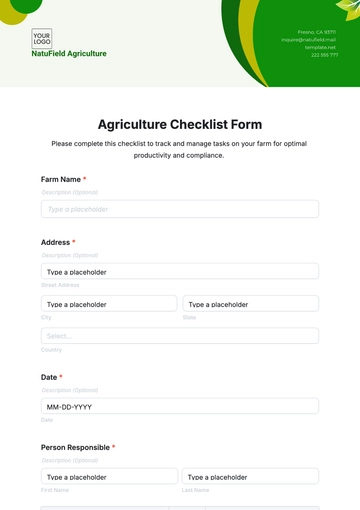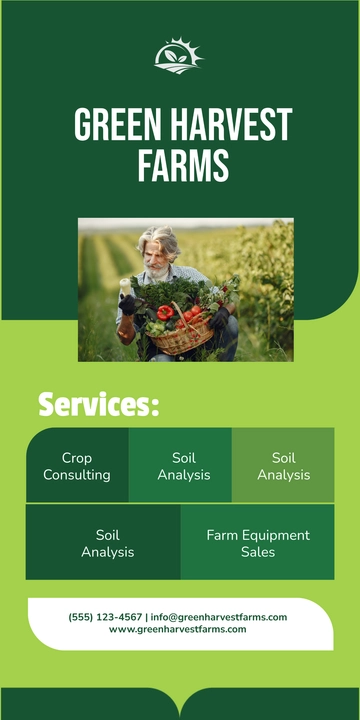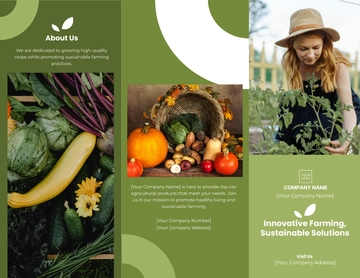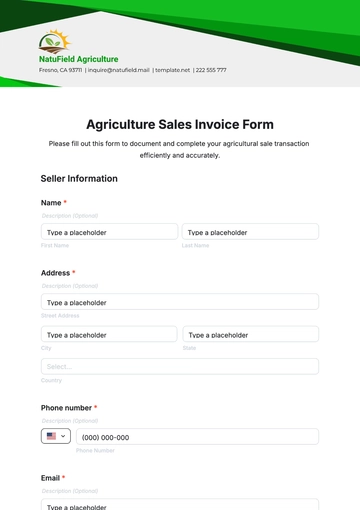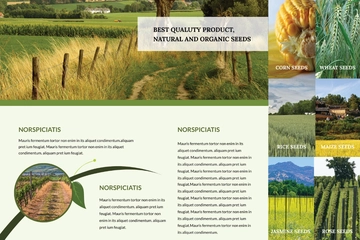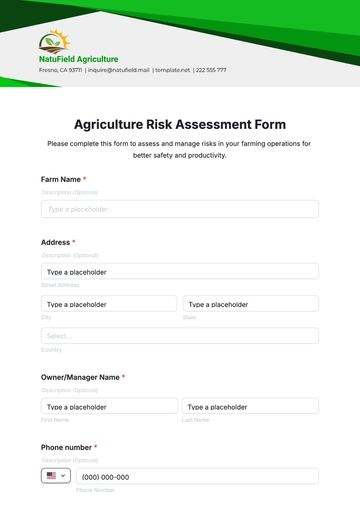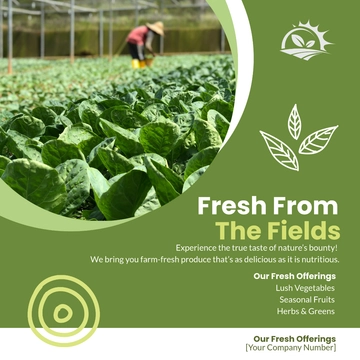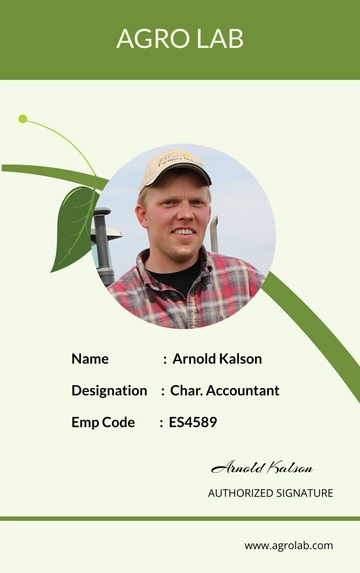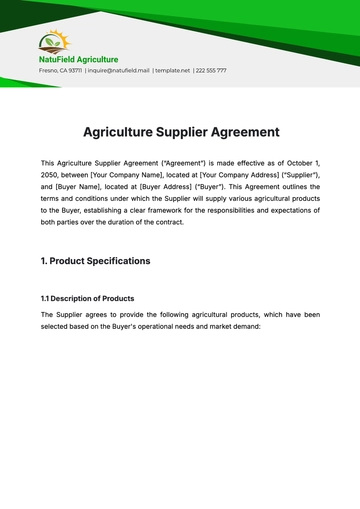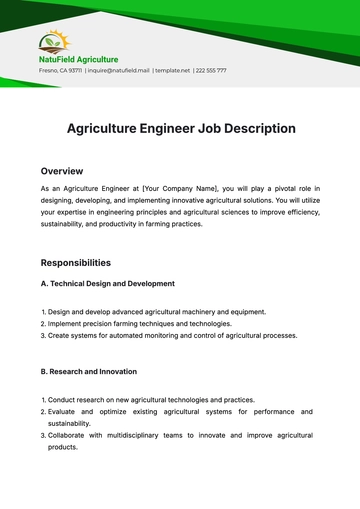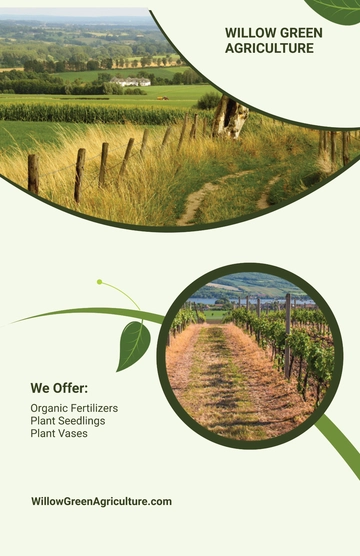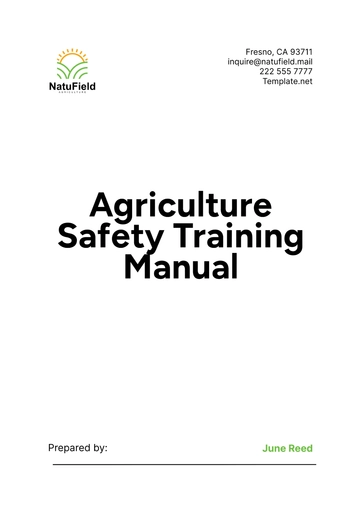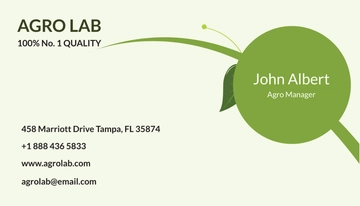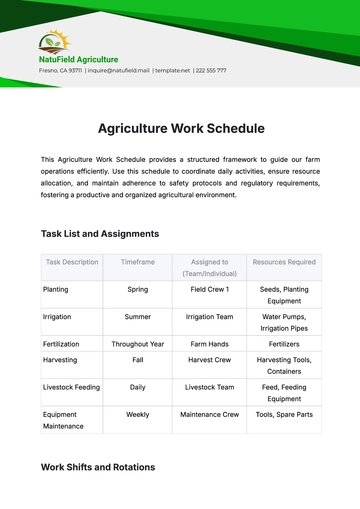Free Agriculture Market Feasibility Study
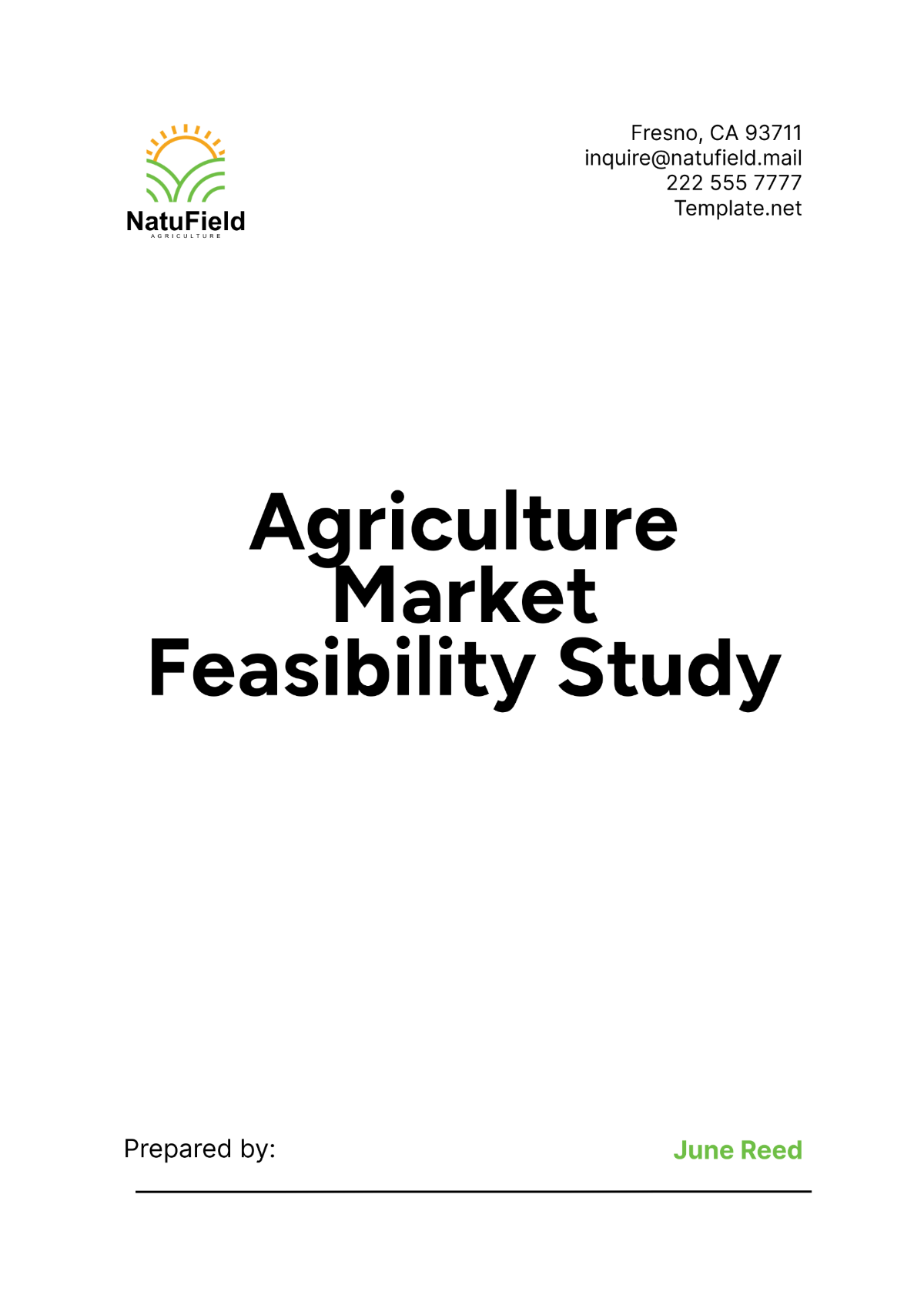
A. Executive Summary
At [Your Company Name], we have completed a comprehensive Agriculture Market Feasibility Study to assess the potential for launching a new organic vegetable farming venture. Our analysis reveals a strong market opportunity driven by a growing consumer preference for fresh, sustainably-produced food. The U.S. organic food sector is expanding at a rate of [0]% annually, with a projected market value of $[0] billion by [2050]. Our study indicates that while the market is competitive, there is a significant demand for high-quality, locally-sourced organic vegetables. This demand presents a valuable opportunity for [Your Company Name] to introduce innovative farming techniques and eco-friendly practices to address the existing market gaps.
Financial projections for the first year show expected revenues of $[0] with a break-even point achievable within 18 months. The competitive analysis highlights opportunities for differentiation through direct-to-consumer sales channels, such as farmers' markets and subscription boxes, which are currently underserved. Based on these findings, we recommend moving forward with the venture. Key next steps include securing initial funding of $[0] for land acquisition, equipment, and initial inventory. By focusing on our unique strengths—such as sustainable farming practices and a commitment to local sourcing—[Your Company Name] is well-positioned to achieve long-term success and become a leader in the organic vegetable market.
B. Project Description
[Your Company Name] is launching a new venture focused on organic vegetable farming, aiming to meet the increasing consumer demand for fresh, sustainably-produced produce. Our project will involve the cultivation of a diverse range of organic vegetables, including leafy greens, root vegetables, and seasonal specialties. The farm will be located on a [10-acre] plot of land in [ABC Location], selected for its fertile soil and ideal growing conditions for organic farming.
The core of our project is to implement innovative, eco-friendly farming practices that emphasize soil health, water conservation, and pest management without synthetic chemicals. We will employ techniques such as crop rotation, composting, and natural pest control to maintain a balanced and sustainable farming environment. Our goal is to provide high-quality organic vegetables through direct-to-consumer channels, including local farmers' markets, a subscription box service, and partnerships with local grocery stores and restaurants.
To support our operations, we will invest in state-of-the-art equipment for planting, harvesting, and processing, and establish a team of skilled professionals to manage daily farm activities and ensure product quality. By focusing on sustainability, transparency, and community engagement, [Your Company Name] aims to become a trusted name in the organic vegetable market and contribute to a healthier food system.
C. Market Analysis
To successfully launch an organic vegetable farming venture, a thorough understanding of the market landscape is essential. Analyzing market trends, consumer preferences, and competitive dynamics provides insights that inform strategic decisions and help identify opportunities for growth. The following table presents a detailed overview of the current market conditions for organic vegetables, highlighting key factors such as market trends, consumer demand, and competitor analysis. This analysis aims to guide [Your Company Name] in making informed decisions about market entry and positioning to achieve long-term success in the organic vegetable sector.
Market Aspect | Details |
|---|---|
Market Size | The U.S. organic vegetable market was valued at $15 billion in 2053, with a projected growth rate of 12% annually. |
Consumer Trends | Growing interest in organic produce due to health benefits, environmental concerns, and sustainability. Increasing preference for local and fresh food options. |
Target Demographics | Health-conscious consumers, environmentally-aware individuals, and local communities seeking fresh, high-quality produce. Predominantly urban and suburban residents aged 25-45. |
Competitive Landscape | The market includes both large organic farms and small-scale local producers. Key competitors include [Competitor A], [Competitor B], and [Competitor C]. Opportunities exist for differentiation through unique product offerings and direct-to-consumer sales. |
Market Gaps | High demand for locally-sourced, organic vegetables in underserved areas. Opportunities for growth in farmers' markets, subscription services, and partnerships with local grocery stores and restaurants. |
Pricing Trends | Organic vegetables are priced 20-30% higher than conventional produce. However, there is room for competitive pricing strategies through direct sales and subscription models. |
Regulatory Environment | Compliance with USDA Organic Certification standards is required. Regulations include organic farming practices, labeling requirements, and annual inspections. |
D. Financial Feasibility
A comprehensive financial feasibility assessment is crucial for evaluating the viability of our organic vegetable farming venture. This analysis provides a detailed overview of the initial investment requirements, ongoing operational costs, and expected revenues to determine the project's financial sustainability and potential profitability. By examining these key financial metrics, [Your Company Name] can make informed decisions about resource allocation, pricing strategies, and long-term planning.
The table below outlines the estimated costs, projected revenues, and profitability for the initial investment, yearly operational costs, and a five-year financial projection for the venture:
Category | Estimated Cost | Revenue | Profitability |
|---|---|---|---|
Initial Investment | $[0] | - | - |
Yearly Operational Costs | $[0] | $[0] | $[0] |
5-Year Projection | $[0] | $[0] | $[0] |
Initial Investment: Initial capital required for land, equipment, and startup costs.
Yearly Operational Costs: Annual expenses for running the farm, including labor, supplies, and maintenance.
Yearly Revenue: Expected income from sales of organic vegetables.
Yearly Profitability: Difference between revenue and operational costs.
5-Year Projection: Cumulative financial outlook showing total investment, revenue, and profit over five years.
E. Legal Considerations
Navigating the legal landscape is a critical aspect of establishing a successful organic vegetable farming venture. Ensuring compliance with all relevant laws and regulations not only avoids legal issues but also lays the foundation for a sustainable and well-regulated business. This section outlines the essential legal considerations that [Your Company Name] must address, including obtaining necessary permits, adhering to agricultural and environmental regulations, and securing adequate insurance coverage.
The following key legal requirements must be met for the successful launch and operation of the farm:
Permits: Obtain appropriate farming and business operation licenses. This includes local permits for land use, state agricultural permits, and federal business licenses.
Regulations: Ensure compliance with agricultural and environmental regulations. This includes USDA Organic Certification standards, state-level agricultural regulations, and environmental protection laws.
Insurance: Secure adequate coverage for property, liability, and crop insurance. This includes general liability insurance, property insurance for farm equipment and buildings, and crop insurance to protect against losses due to natural disasters or pests.
F. Operational Feasibility
Evaluating the operational feasibility of [Your Company Name]'s organic vegetable farming venture involves assessing the practical aspects of starting and running the farm. This analysis covers the necessary infrastructure, resource management, and operational strategies required to ensure the project's success. By examining these components, we can identify potential challenges and opportunities, ensuring that the farm can operate efficiently and effectively.
Infrastructure and Resources
The foundation of a successful organic vegetable farm includes essential infrastructure and resources. [Your Company Name] will invest in a [10-acre] plot in [ABC Location], selected for its ideal soil conditions and climate for organic farming. Key infrastructure includes greenhouses for extended growing seasons, irrigation systems for water management, and storage facilities for harvested produce. State-of-the-art equipment such as tractors, plows, and seeders will be used to streamline planting, maintenance, and harvesting processes.
Operational Strategies
Efficient farm management requires a well-defined operational strategy. [Your Company Name] will implement best practices in organic farming, including crop rotation to maintain soil fertility, composting to enhance soil health, and natural pest control methods. A skilled team of farm workers, including an agronomist, farm manager, and seasonal laborers, will be hired to manage daily operations, oversee production, and ensure high-quality standards. Additionally, a detailed operational plan will outline tasks such as planting schedules, harvesting timelines, and quality control measures.
Challenges and Solutions
Key challenges include managing seasonal variations in crop yield and maintaining consistent product quality. To address these challenges, [Your Company Name] will develop contingency plans, such as diversifying crop varieties to mitigate risks from pests or weather conditions and implementing rigorous quality control procedures.
By focusing on these operational elements, [Your Company Name] aims to establish a successful and sustainable organic vegetable farm.
G. Risks
Understanding and mitigating potential risks is crucial for the success of [Your Company Name]'s organic vegetable farming venture. Identifying these risks allows for the development of strategies to manage challenges that could impact the project's viability and profitability. The following list outlines key risk categories associated with the venture, each representing a potential threat to the success of the farm. By addressing these risks proactively, [Your Company Name] can develop effective contingency plans and ensure the long-term sustainability of the business.
Market Risks: Fluctuations in demand or market prices.
Climate Risks: Adverse weather conditions impacting crop yields.
Operational Risks: Equipment failure or labor shortages.
Financial Risks: Insufficient cash flow or investment.
H. Recommendations
After a comprehensive analysis of the market, financial feasibility, and operational aspects of [Your Company Name]’s organic vegetable farming venture, the following recommendations are made to ensure the success and sustainability of the project. Implementing these strategies will help mitigate risks, maximize opportunities, and establish a strong foundation for long-term growth.
1. Secure Necessary Permits and Insurance
The first step in launching the venture is to obtain all required permits and licenses for farming operations and business activities. This includes local land use permits, state agricultural permits, and federal business licenses. In addition, securing comprehensive insurance coverage is essential. This should include general liability insurance to protect against legal claims, property insurance for farm equipment and infrastructure, and crop insurance to safeguard against losses from natural disasters or pests. By addressing these regulatory and risk management needs upfront, [Your Company Name] can operate within legal requirements and protect against unforeseen challenges.
2. Invest in High-Quality Resources
Investing in high-quality resources will significantly impact the success of the farming venture. This includes purchasing state-of-the-art farming equipment, such as tractors, seeders, and irrigation systems, and setting up efficient greenhouses and storage facilities. Additionally, sourcing high-quality seeds and fertilizers that meet organic standards is crucial for ensuring healthy crops and a successful yield. Building a skilled and dedicated team of agronomists, farm managers, and seasonal laborers will also support effective farm operations and product quality.
3. Establish a Strong Market Presence
Building a robust market presence is vital for the success of the organic vegetable farm. This involves creating a strong brand identity and engaging in targeted advertising to reach potential customers. Developing partnerships with local grocery stores, restaurants, and farmers' markets will expand sales channels and increase market visibility. Additionally, launching a subscription box service and actively participating in community events will help build a loyal customer base and promote the farm’s products.
4. Regularly Review and Adapt Operations
To maintain relevance in the dynamic organic vegetable market, it is important to regularly review and adapt operational strategies. This includes monitoring market trends, customer preferences, and competitive dynamics to make informed decisions about product offerings and marketing approaches. Implementing feedback mechanisms for customers and staying abreast of industry developments will enable [Your Company Name] to adjust operations effectively and seize new opportunities for growth.
By focusing on these strategic areas, [Your Company Name] can navigate the challenges of the organic vegetable farming industry and build a successful and sustainable business.
- 100% Customizable, free editor
- Access 1 Million+ Templates, photo’s & graphics
- Download or share as a template
- Click and replace photos, graphics, text, backgrounds
- Resize, crop, AI write & more
- Access advanced editor
Assess new opportunities with the Agriculture Market Feasibility Study Template from Template.net. This fully customizable and editable template is ideal for evaluating market viability. Easily editable in our Ai Editor Tool, you can tailor it to your specific requirements, ensuring a comprehensive and professional feasibility study for your agricultural projects.
